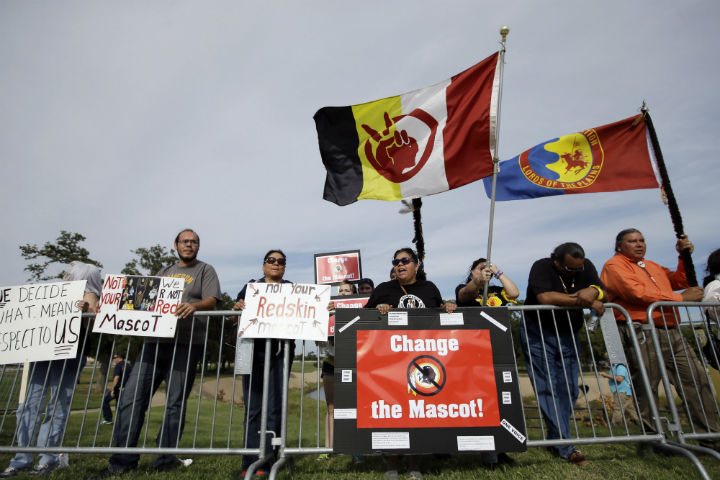Friday will be a historic day as the Confederate flag, long considered a symbol of racism and oppression in the United States, will be taken down from outside the South Carolina state house.

Gov. Nikki Hayley signed the legislation Thursday afternoon that will see the flag come down at 10 a.m. on Friday, after more than 50 years.
READ MORE: Confederate flag to be removed from South Carolina Statehouse on Friday
The flag’s removal, which comes after the murder of nine black congregants of Charleston’s Emanuel African Methodist Episcopal church on June 17, is being applauded. But it’s far from the only step that needs to be taken to resolve racial inequality and hatred in the United States.
There are many more examples of racist symbols that remain in public view — in particular, those that are offensive to the Native American population.
Among those that have been the most galvanizing is the name and logo of the Washington Redskins football team. The U.S. capitol is a football town and the logos are everywhere, especially on a home game day.
Washington, D.C.-based tribal rights attorney Tara Houska said the Confederate flag may be different than a football team’s name and mascot, on the surface, but she believes there’s no difference when it comes to perpetuating racism.
“Football in the United States is like a religion,” she said. “So for people to see that imagery and dress up in headdresses, for love of their team, at the same time they’re simultaneously dehumanizing an entire race of people.”
- 3 bodies recovered likely those of 2 Australians and American who went missing
- RCMP arrests alleged hitmen accused of killing B.C. Sikh leader
- Prelude to an assassination: India’s ‘incompetent’ campaign against slain B.C. Sikh leader
- Russian state-backed TikTok posts surge as U.S. election nears: report
Houska, who spoke to Global News Thursday while attending the first-ever Tribal Youth Gathering hosted by the White House, is a founding member of Not Your Mascots.
It’s a non-profit organization “dedicated to addressing the misappropriation of Indigenous identity and imagery through the acceptance of mascots, stereotypes and racist behaviours.” The group argues such representations have a “harmful effect” on indigenous children and communities.
READ MORE: Tears, family memories part of debate on removing Confederate flag in South Carolina
The legal battle to get the football team to drop the name and mascot has been going on for decades.
But, there was a big victory on Wednesday when a federal court upheld a ruling that invalidated the Washington Redskins’ trademark registrations because the name “may disparage” Native Americans. That doesn’t spell an end for the team name, but the ruling is seen as a move in that direction. The team plans to appeal.
Houska thinks the removal of the Confederate flag will help people further understand how powerful some symbols can “affect the way people think and the way that people respond to one another.”
“People just brush it off like ‘Oh, it doesn’t matter. It’s not important,'” she said.
If you were to argue that the name and logo of a football team isn’t as big a deal as a flag, take a look up the East Coast to Massachusetts, where the state flag is seen by some as depicting the historic oppression of Native Americans.
The flag depicts a Native American holding a bow in one hand and an arrow in the other. But above that is an arm bearing a sword; below is the motto, “By the sword we seek peace, but peace under liberty,” in Latin.
“It depicts oppression,” John Peters Jr., a member of the Mashpee Wampanoag tribe and executive director of the Massachusetts Commission on Indian Affairs, told the Boston Globe on June 25. “To have the sword over our head . . . it signifies a policy that has affected all tribes.”
Then there’s the tiny community of Whitesboro, New York, about 160 kilometres west of state capital Albany, where the village seal shows a white settler wrestling (some say strangling) a Native American.
Mayor Patrick O’Connor, in an interview with the Village Voice on Tuesday, disagreed with the assessment that the seal is racist, describing it as depicting a “friendly wrestling match” — something that was apparently commonplace when the village was settled in the 1700s.
“I think you have to take all the facts into consideration. And if people take the time to do that and they reach out to us, or they do the research themselves, it’s actually a very accurate depiction of friendly wrestling matches that took place back in those days,” O’Connor said.
“I would argue that you will find supporters to change the seal and you will find supporters to keep the seal. It absolutely is not meant as a sign of disrespect, and, as you look at the seal in totality, with the story that the seal represents, I don’t believe that it’s offensive.”
READ MORE: Canadian retailers pulling confederate flag from stores following Charleston shooting
If you’ve followed the debate over the removal of the Confederate flag, proponents have argued passionately that the banner is an important part of American history and a source of pride.
But Houska said if you need to make the effort to explain why such symbols aren’t racist, you probably need to take a closer look at them.
“It’s the same thing with Native American symbols like here in D.C. We’re surrounded by the Washington football team everywhere, the caricature of the Native American everywhere. This is why people don’t think we’re real people,” Houska said. “I hope that these conversations continue and people realize this is wrong.”


Comments